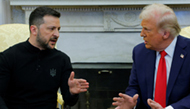▶ By Peter Eigen
Korea’s history of close relationship between political dictatorship and economics has been an important factor in this current assessment. The 1997 economic crisis in Asia, based also in part on corruption in the financial sector, also contributed to this result. All in all, the 2000 CPI ranking indicates Korea needs to make further efforts in order to curb corruption.
Are so-called ‘Asian values’ the real cause of corruption?" Is there any kind of corruption affinities with any skin-color, religion, language, ideology, continent, or nation? No, we can find corruption in every society. Corruption takes many forms and is a universal cancer.
The Korean government itself has proclaimed a war against corruption. It prepared anti-corruption programs, which are now being enforced. Furthermore, Seoul metropolitan government’s ‘Online Procedures Enhancement for civil applications’ (OPEN) system is accepted worldwide as one of the best examples in preventing corruption in municipal administration.
Recently, the Anti-Corruption Network in Korea — now TI’s National Chapter in Korea — reported that people see corruption as slightly declining compared to a few years ago. It can be taken as a small sign of improvement.
However, the CPI 2000 should remind everyone that the fight against corruption has not been relaxed. We all yearn for improvement, but positive change only comes slowly when endemic corruption is the enemy. Perceptions of levels of corruption do not change greatly from one year to the next. Positive results are only going to emerge from tireless and consistent multi-year efforts.
Anti-Corruption Law in Korea
Korea is currently seeing large efforts to pass an anti-corruption law. It is important that there will be a protection and reward program for the whistle-blowers by the anti-corruption regulation, providing for an additional and effective way to curb corruption next to external auditors.
It empowers public officials themselves to become fighters against corruption, not friends of corruption; changing public servants from objects to subjects of the anti-corruption movement. The point is how to develop the bright sides of their characters and how to control the dark sides.
And I would like to mention again that numerous developed countries have also launched initiatives against money laundering, while awareness is growing in export credit agencies and development assistance agencies that challenge corrupt practices is vital.
Integrity Pacts
The Integrity Pacts (IP) concept was developed in the middle of the 1990’s by TI. It is a multilateral and mutual pact against corruption among government offices and companies submitting a tender for specific projects. It is intended to accomplish two primary objectives: 1) to enable companies to avoid resorting to bribery by providing assurances that their competitors will also not participate in the illegal practice, and government procurement agencies will undertake to prevent corruption, including extortion, by their officials and to follow transparent procedures; and 2) to enable governments to reduce the high cost and the distorting impact of corruption on public procurement.
TI-Korea has called upon the Korean government and municipalities to adopt the Integrity Pact for transparent public procurement. The fact that three municipalities, including Seoul metropolitan government, are currently applying Integrity Pacts to their tendering process is in my view a good start for transparent administration of local government.
On the other hand, despite these implementations, other government bodies and municipalities remain silent. The Integrity Pact will work effectively only when the entire public sector, including public companies, participate. Adopting this concept nationwide can make a strong impact against bribery and graft in public business. (TI-Korea will hold a workshop Dec. 4-6 on the implementation of the Integrity Pact with the participation of TI’s specialists on this subject.)
Business Ethics System
Corruption is not just the product of accepting bribes. There also is the bribe-giving side of the corruption coin, as well. Showing this side of the coin as well is the intention of TI’s Bribe Payers Index (BPI), first published in 1999. In this index Korea ranked 18th out of 19 countries. What is the meaning of BPI and that ranking?
This bribe-paying side of the corruption equation is extremely important right now. Many of the street protests that we see at major conferences — such as those in Seattle, Prague, and Seoul — reflect the distrust of the people toward globalization and the role of business in the international economy.
Transparency in business dealings is more important than ever and corporations should see the protests as a challenge to them to act with integrity. The OECD convention on Combating Bribery of Foreign Officials in International Business Transactions was adopted in Korea on Dec. 17, 1997 as Law 5588. However, it is vital that countries that have ratified OECD Anti-Corruption Convention now enforce it and that companies demonstrate that they are in compliance.
This year, TI-Korea conducted research on 30 major companies in Korea regarding how many have codes of ethics or codes of conduct, and what their contents are. As a result, it was revealed that only eight companies have such codes. But even the existing codes remained on the formal side, rather than having easy-to-use, understandable, and pragmatic language.
Companies should see the need for education in business ethics as well as set-up ethics committees. The private sector should also recognize the importance of protecting whistle-blowers. As TI-Korea has argued, a business ethics system is one of the major elements for the anti-corruption struggle.
Civil Participation
Lastly, civil participation can be added as one of the main powers to curb corruption. Korean NGOs’ have a pivotal role in the nation’s anti-corruption movement. Activists, specialists and well-known personalities require civil participation and support in all parts of society to become effective.
People can be a more effective corruption control subject through their engagement than other visible institutions.
Looking at the progress or political democracy in Korea, there is also hope for the fight against corruption. It is my belief that this hope is on the way toward realization. Many NGOs have proposed and participated in the anti-corruption movement, in succession with human rights, social justice and democratization movements of the past several decades. Their campaigns during the last general election had an important impact on curbing political corruption in Korea.
National integrity System
However, none of these programs can be a panacea, one-size-fits-all, that solves all problems. In many cases corruption has been treated as a matter of private lack of morality or ethics of individual public officials. There has been little attention placed upon corruption as a systemic problem. Social background is an important factor of corruption. Low wages play another role in absolute or comparative, real or perceptive terms.
And while corruption in public administration is a key issue in the people’s perception, transparency in the private sector, academia and even within civil society play an important role as well.
Thus I would like to point out the importance of a systematic perspective or approach. TI recommends that a ‘National Integrity System’ should be constructed to control corruption.
As TI-Korea informed me, it is preparing to hold an anti-corruption fair on Dec. 10-12 in which the private and public sectors and civil society can participate. During this event, governmental bodies, private companies, economic organizations, as well as civil society organizations will exhibit their most effective practices for corruption prevention. I trust that this exhibition will promote possible benchmarking between them, including municipalities.
This kind of cooperation can be a model anti-corruption strategy for other countries. The methods and systems developed and applied in Korea will provide valuable experiences and will help to curb corruption worldwide.
스마터리빙
more [ 건강]
[ 건강]이제 혈관 건강도 챙기자!
[현대해운]우리 눈에 보이지 않기 때문에 혈관 건강을 챙기는 것은 결코 쉽지 않은데요. 여러분은 혈관 건강을 유지하기 위해 어떤 노력을 하시나요?
 [ 건강]
[ 건강]내 몸이 건강해지는 과일궁합
 [ 라이프]
[ 라이프]벌레야 물럿거라! 천연 해충제 만들기
 [ 건강]
[ 건강]혈압 낮추는데 좋은 식품
[현대해운]혈관 건강은 주로 노화가 진행되면서 지켜야 할 문제라고 인식되어 왔습니다. 최근 생활 패턴과 식생활의 변화로 혈관의 노화 진행이 빨라지고
사람·사람들
more많이 본 기사
- 쿠팡 김범석, 30~31일(한국시간) 연석청문회 또 불출석 의사… “일정 있어”
- ‘6·3 大戰’ 앞둔 대통령실 참모들 시선집중…10여명 출마 거론
- ‘통일교 자금관리’ 한학자 前비서실장 재소환…피의자 전환
- 여야, ‘통일교·종합 특검’ 정면충돌 예고…연말연시 대치정국
- 캐나다, 우크라에 18억달러대 추가 재정 지원키로
- 뉴욕에 3년만에 최대 폭설…항공기 수천편 결항·지연
- ‘파친코’ 이민진 작가 “맘다니 뉴욕시장, 긍정적 변화 기대”
- 황하나, 남편 사망→캄보디아서 남친과 출산..귀국 후 구속 ‘파란만장’
- 태국-캄보디아, ‘101명 사망’ 교전 20일만에 휴전
- NASA 신임 국장 “美, 트럼프 임기내 달에 다시 갈것”
- “트럼프, 29일 네타냐후 회담서 가자휴전 이행문제 제기키로”
- 젤렌스키 미국행… “레드라인 있지만 타협점 찾을 수 있어”
- 180일간 김건희만 판 특검 오늘 수사 종료…’V0’ 단죄 성과
- 이이경·조세호 다 떠나고..유재석 곁엔 결국 ‘무도’ 인연이었다
- 오윤아 “子, 학교 떨어져 잘못 키웠나..방치 했나 싶어 눈물”
- ‘AI 조작 번복’ 폭로자 vs ‘유재석 패싱’ 이이경..하차 잔혹사로 번진 사생활 논란 [2025 연말결산]
- 마지막 토요일도 도심 집회… “내란 … 1
- IS 확실했나…트럼프 ‘성탄절 나이지리아 폭격’ 갸우뚱
- ‘이강달’ 강태오, 로코 달인은 다르다.. “김세정도 눈빛 좋다고”
- “개인 선정은 SON이 유일?” 손흥민, 축구계 8대 기적 선정이 더 대단한 이유 “퀴라소 월드컵 진출보다 멋져”
- 뉴욕시 폭설에 항공기 수천편 취소·지연 사태
- 올해 美 기업 파산신청 증가… “관세·고물가·고금리 원인”
- “솔직히 자신은 없죠” 3루수 GG 송성문, 유격수도 아닌 외야라니... 생존 본능 발동할까
- “올해 최고 주목받은 테크 거물은 머스크 아닌 래리 엘리슨”
- “2025년 높이뛰기는 우상혁과 커의 무대” 세계육상연맹 조명... 우상혁도 “커와 계속 경쟁해야 해”
- 러, 젤렌스키 미국행 앞 대규모 공습…우크라도 러에 드론 공격
- 보수 야당 “의원직 사퇴하고 법심판 받아야”…김병기에 총공세
- 쿠팡 ‘정부 반박’ 영문성명 미묘한 표현차… ‘잘못된 비난’ 부각
- “SD서 최고 활약 김하성, 2024시즌만큼만 쳐줘도 ATL 3승 더한다” ESPN 극찬
- 특검, ‘로저비비에’ 김기현 부부 기소…尹 뇌물 수사는 경찰로
1/5지식톡

-
 미 육군 사관학교 West Poin…
0
미 육군 사관학교 West Poin…
0https://youtu.be/SxD8cEhNV6Q연락처:wpkapca@gmail.comJohn Choi: 714-716-6414West Point 합격증을 받으셨나요?미 육군사관학교 West Point 학부모 모…
-
 ☝️해외에서도 가능한 한국어 선생님…
0
☝️해외에서도 가능한 한국어 선생님…
0이 영상 하나면 충분합니다!♥️상담신청문의♥️☝️ 문의 폭주로 '선착순 상담'만 진행합니다.☎️ : 02-6213-9094✨카카오톡ID : @GOODEDU77 (@골뱅이 꼭 붙여주셔야합니다…
-
 테슬라 자동차 시트커버 장착
0
테슬라 자동차 시트커버 장착
0테슬라 시트커버, 사놓고 아직 못 씌우셨죠?장착이 생각보다 쉽지 않습니다.20년 경력 전문가에게 맡기세요 — 깔끔하고 딱 맞게 장착해드립니다!장착비용:앞좌석: $40뒷좌석: $60앞·뒷좌석 …
-
 식당용 부탄가스
0
식당용 부탄가스
0식당용 부탄가스 홀세일 합니다 로스앤젤레스 다운타운 픽업 가능 안녕 하세요?강아지 & 고양이 모든 애완동물 / 반려동물 식품 & 모든 애완동물/반려동물 관련 제품들 전문적으로 홀세일/취급하는 회사 입니다 100% …
-
 ACSL 국제 컴퓨터 과학 대회, …
0
ACSL 국제 컴퓨터 과학 대회, …
0웹사이트 : www.eduspot.co.kr 카카오톡 상담하기 : https://pf.kakao.com/_BEQWxb블로그 : https://blog.naver.com/eduspotmain안녕하세요, 에듀스팟입니다…
케이타운 1번가
오늘의 1면
오피니언

새해 더 중요해지는 노동법 준수

연말연시, 안전하고 차분하게
 캐슬린 파커 워싱턴포스트 칼럼니스트
캐슬린 파커 워싱턴포스트 칼럼니스트 [캐슬린 파커 칼럼] 지미 라이의 마지막 희망
 유경재 나성북부교회 담임목사
유경재 나성북부교회 담임목사 [한국춘추] 미국의 힘
 전병두 서북미수필가협회 회원
전병두 서북미수필가협회 회원 [금요단상] 비자 발급
 박일근 / 한국일보 수석논설위원
박일근 / 한국일보 수석논설위원 [지평선] 스님의 주례사
 신상철 / 고려대 고고미술사학과 교수
신상철 / 고려대 고고미술사학과 교수 [미술 다시보기] 신의 모습을 닮고자 한 예술가
 스티브 강 전 한인민주당협회 회장
스티브 강 전 한인민주당협회 회장 [스티브 강 ‘인사이드 미국’] 2026 중간선거: 트럼프 지지율 하락이 말해주는 것
 김홍일 케이유니콘인베스트먼트 대표
김홍일 케이유니콘인베스트먼트 대표 [기고] 안정의 기준은 어떻게 제도가 되었나
1/3지사별 뉴스

물류거점창고에 불체자 8만명 수용 추진
도널드 트럼프 행정부가 이민자 구금·추방을 효율화하기 위해 전국 물류거점 창고에 8만명 규모의 수용시설 확보를 추진한다고 24일 워싱턴 포스트…
‘학자금 상환’ 안하면 임금압류

“온 세상에 희망·평화의 빛 스며들길”
가자지구와 우크라이나에서의 전쟁, 고립과 불평등으로 세상이 어지러운 가운데 워싱턴 지역 각급 한인교회와 성당들이 성탄절을 맞아 일제히 예배와 …
“연말은 스트레스·새해 결심은 없다”

“올해 최고 주목받은 테크 거물은 머스크 아닌 래리 엘리슨”
올해 미국에서 가장 주목받은 기술업계 거물은 일론 머스크 테슬라 최고경영자(CEO)가 아닌 래리 엘리슨 오라클 창업자·회장이라고 블룸버그 통신…
[새해부터 이렇게 달라진다] 최저임금 또 오르고… 유급 병가는 더 확대

오늘 하루 이 창 열지 않음 닫기 





















































.png)


댓글 안에 당신의 성숙함도 담아 주세요.
'오늘의 한마디'는 기사에 대하여 자신의 생각을 말하고 남의 생각을 들으며 서로 다양한 의견을 나누는 공간입니다. 그러나 간혹 불건전한 내용을 올리시는 분들이 계셔서 건전한 인터넷문화 정착을 위해 아래와 같은 운영원칙을 적용합니다.
자체 모니터링을 통해 아래에 해당하는 내용이 포함된 댓글이 발견되면 예고없이 삭제 조치를 하겠습니다.
불건전한 댓글을 올리거나, 이름에 비속어 및 상대방의 불쾌감을 주는 단어를 사용, 유명인 또는 특정 일반인을 사칭하는 경우 이용에 대한 차단 제재를 받을 수 있습니다. 차단될 경우, 일주일간 댓글을 달수 없게 됩니다.
명예훼손, 개인정보 유출, 욕설 등 법률에 위반되는 댓글은 관계 법령에 의거 민형사상 처벌을 받을 수 있으니 이용에 주의를 부탁드립니다.
Close
x